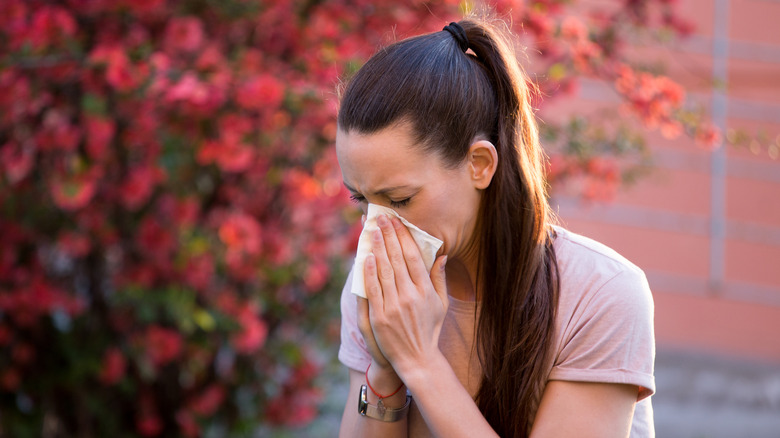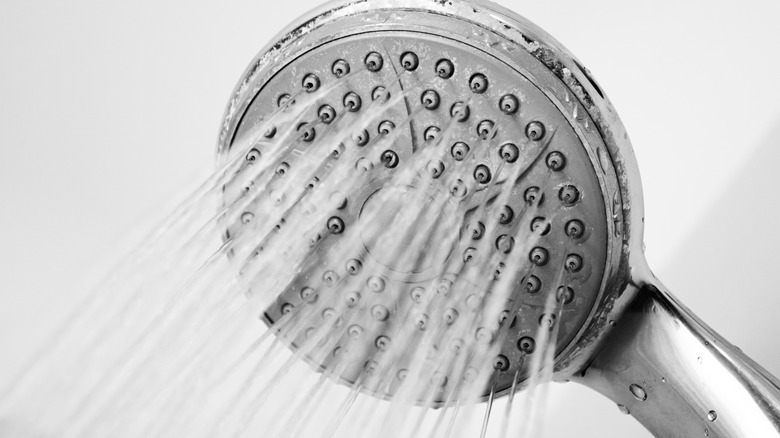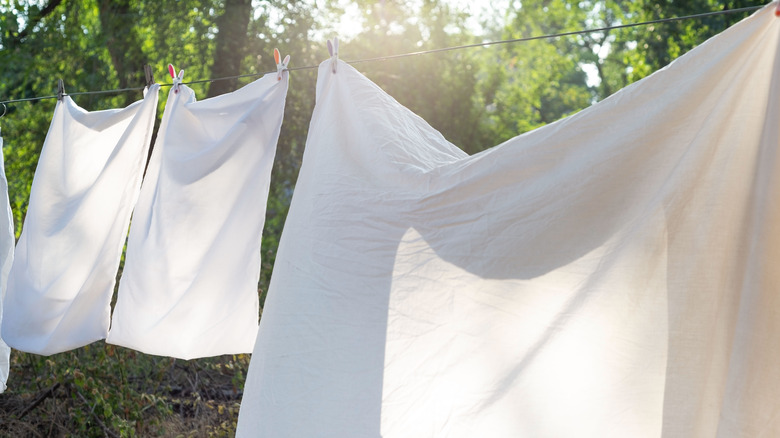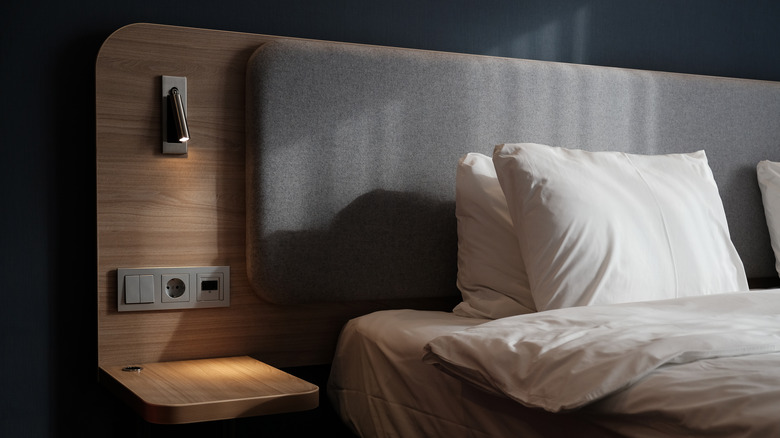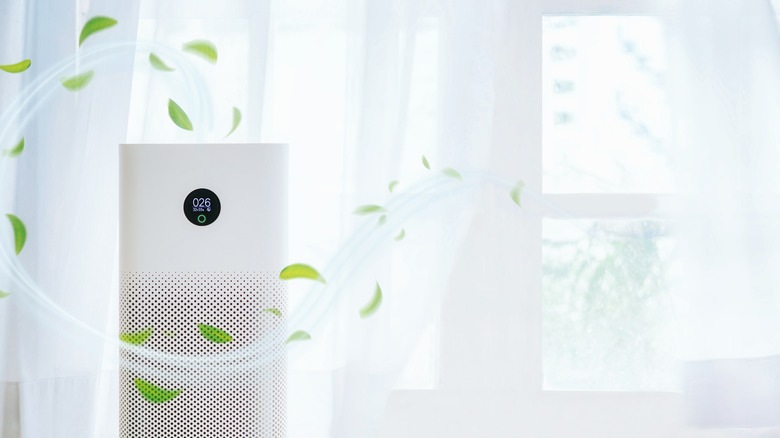How To Sleep Better When You Have Allergies
If you love to sleep and you hate having allergies, raise your hand!
If your beloved beauty sleep has ever been dampened by your allergy symptoms, go ahead and 'boo' your allergies, nice and loud! That's right, let it out.
See? We get it. The only thing worse than having allergies is having allergies and having a lousy night's sleep.
The Sleep Foundation notes that those of us who suffer from allergies are significantly more likely to suffer from sleep-related issues like insomnia, poor sleep efficiency, snoring, and sleep apnea. And the trouble doesn't stop with the rising of the sun. A night with little or poor sleep makes for a higher likelihood of a day filled with fatigue, headaches, and sinus pain.
But fear not, friends! We are not doomed to a life of sniffles and no sleep. There are a few things you can try that might alleviate your allergy symptoms and allow you a peaceful night of sleep.
A steamy shower
Nothing gets you all warm and cozy and ready for bed like a steaming hot shower. The Sleep Foundation reports that many scientists refer to the hypothesis that a hot shower or bath before bed can promote better sleep as the "warm bath effect." A meta-analysis of 17 studies published in Sleep Medicine Review supports that hypothesis, finding that a shower or bath with water at temperatures between 104 and 108.5 degrees Fahrenheit can help with the body's natural ability to regulate temperature, not only improving the overall quality of sleep, but helping people to fall asleep faster too.
Allergist and immunologist Heather Moday told Mindbodygreen that steam, compounded with the essential oils of rosemary and eucalyptus, can have a soothing effect on the sinuses and clear up some congestion. You can add a few drops to your shower or bath. If you're in a pinch, add 10 to 15 drops of the oils to a bowl of steaming water, drape a towel over your head, hover over the bowl, and take a few deep breaths.
Clean sheets
Is there truly anything better than pulling back your duvet and sliding in between two freshly laundered sheets? The softness. The smell. If you are not already crawling into your bed after that enticing description, let us tell you why clean sheets are a game-changer when it comes to your allergies.
If dust is your archnemesis, the Rolling Stone reports that bedding made from tightly woven materials like silk, organic cotton, and microfiber will protect from dust mites wiggling their way into your pillows and mattress.
The Mayo Clinic suggests washing sheets, pillowcases, and blankets at least once a week, in water no cooler than 130 degrees Fahrenheit, just to be sure you kill all those little buggers. Dr. Moday recommends a more aggressive routine, urging you to consider changing pillowcases every night, or every other night, if your washer/dryer situation permits you to do so (per Mindbodygreen).
Take a look at your sleep environment
Crashing with no blankets on your friend's lumpy couch just won't do if you want to get a good amount of sleep. In fact, creating your perfect sleep environment can be a pretty elaborate song and dance these days. There are a few small alterations you can make to yours that might reduce the severity of your nighttime allergies.
The Sleep Foundation insists that the temperature of your room has a lot to do with the quality of your sleep, and that it's best to keep your thermostat between 60 and 67 degrees Fahrenheit if you're in the market for optimal sleep. Dr. Moday agrees, adding that higher temperatures can cause nasal passages to swell, so a cool room will give you the best chance at easy breathing (per Mindbodygreen).
If you share your sleep environment with a pet who causes you to sniffle and sneeze, allergist and immunologist Flavia Cecilia Lega Hoyte told Everyday Health that you might consider keeping your fur babies out of the bedroom. (To which we might say, "Le gasp! Never!")
Pulling out the big guns
When we say the words 'air purifier' does your brain immediately go to that place where it's like, "Oh no! Too fancy! Unattainable! Air purifier?...Ha! Do they think I'm the Queen of England?" If it doesn't, well good on you for being well-versed on the subject of air purifiers. If it did, allow us to blow your mind... A basic, tabletop air purifier with a nearly five-star rating can be ordered from your phone for as little as 50 bucks. And how can an air purifier help, you ask?
When speaking with Mindbodygreen, Dr. Moday suggests (in slightly less flowery language, perhaps) that pollen has a sneaky way of making its way into your house and hanging around with its notoriously hard to get rid of friend, dust. An air purifier is the cranky roommate you need to get those lingerers out of your place quickly, improving your air quality and keeping those allergens from irritating you.
Consider seeing an allergist
Allergies are a bummer. And it's an even bigger bummer when you feel like you've tried everything and you still suffer through a stuffy nose every night and wake up with itchy eyes every morning. If over-the-counter medications just aren't doing the trick and you feel like you're going to lose it if you have to change your pillowcase one more time, it's probably time to schedule an appointment with an allergist.
According to the American College of Allergy, Asthma, and Immunology, a visit with an allergist could include allergy testing, a simple procedure that can tell you exactly what you're allergic to, allowing you to better treat your symptoms. An allergist can also prescribe allergy medication or get you started on immunotherapy in the form of allergy shots. Allergy and Asthma Care of Blakeney reports that immunotherapy has a success rate of 90% when administered correctly. So call your doctor and set up an appointment and finally know what it feels like to kiss your doggo's snoot in peace!

